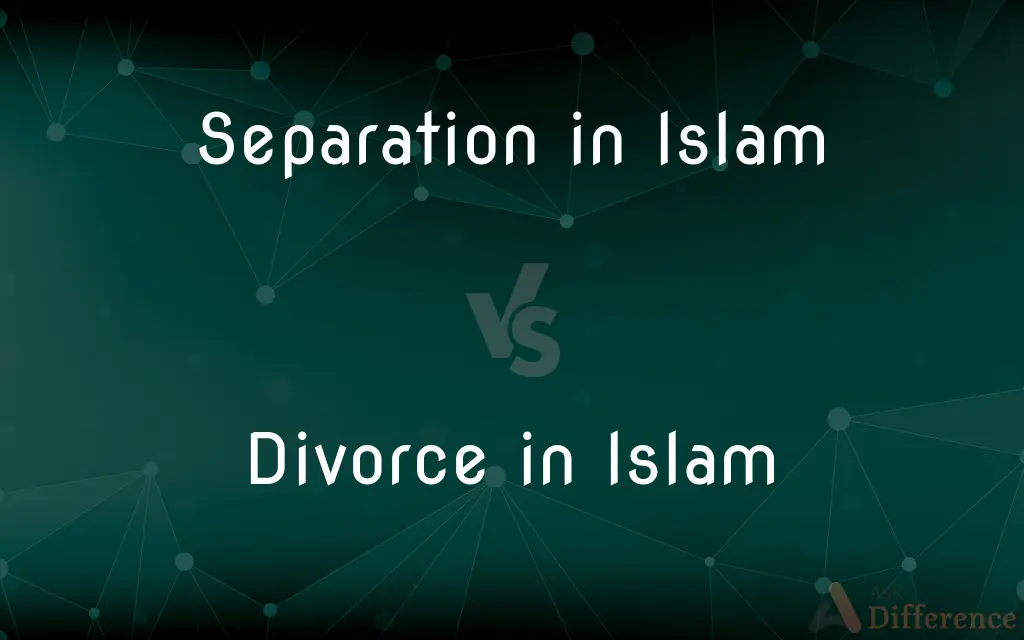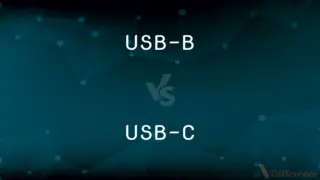Separation in Islam vs. Divorce in Islam — What's the Difference?
By Tayyaba Rehman & Fiza Rafique — Published on February 1, 2024
Separation in Islam is temporary or indefinite cessation of cohabitation between married partners without legally ending the marriage. Divorce in Islam is the formal and legal dissolution of a marriage, following specific Islamic procedures.

Difference Between Separation in Islam and Divorce in Islam
Table of Contents
ADVERTISEMENT
Key Differences
Separation in Islam refers to a situation where spouses cease living together but remain legally married. Divorce in Islam, known as 'Talaq,' is the legal process of ending a marriage.
During a separation in Islam, the marital relationship is not formally dissolved, allowing for the possibility of reconciliation. In contrast, a divorce in Islam represents a final termination of the marital bond.
Separation in Islam does not require formal legal procedures, whereas divorce in Islam involves specific religious and legal steps, including the pronouncement of 'Talaq.'
Financial and custodial arrangements during separation in Islam may vary and are not legally binding. In the case of divorce in Islam, these arrangements are formalized and legally enforced.
Emotional and social implications of separation in Islam can differ significantly from those of divorce, with the latter often carrying more profound personal and communal consequences.
ADVERTISEMENT
Comparison Chart
Legal Status
Married status is maintained
Legally ends the marriage
Reconciliation Possibility
Possible without formal procedures
Requires specific procedures for remarriage
Procedures Required
No formal religious/legal steps needed
Formal religious/legal steps are necessary
Financial/Custodial Terms
Informal and not legally binding
Formalized and legally enforced
Social Implications
Generally less severe
Often more profound and community-involved
Compare with Definitions
Separation in Islam
A phase where Muslim spouses live apart without legally ending their marriage.
They chose separation in Islam to contemplate their future together.
Divorce in Islam
The legal ending of a Muslim marriage through specific Islamic procedures.
After their divorce in Islam, they returned to being single individuals.
Separation in Islam
A non-legal pause in marital cohabitation in Islam.
They opted for separation in Islam rather than an immediate divorce.
Divorce in Islam
A legal separation of Muslim spouses with binding financial and custodial terms.
Post-divorce, they adhered to the custody terms agreed upon in their Islamic divorce.
Separation in Islam
A temporary cessation of cohabitation in a Muslim marriage.
Their Islamic separation allowed them time to resolve personal issues.
Divorce in Islam
Termination of marriage in Islam, often involving the pronouncement of 'Talaq.'
He initiated the divorce in Islam by pronouncing Talaq.
Separation in Islam
A period of living apart for Muslim spouses, retaining marital ties.
Their separation in Islam was a period of reflection and personal growth.
Divorce in Islam
A formal process in Islam to dissolve a marital relationship.
The process of their Islamic divorce was guided by religious principles.
Separation in Islam
An informal arrangement in a Muslim marriage without legal dissolution.
During their separation, they maintained financial support.
Divorce in Islam
An irreversible termination of a Muslim marriage.
Their decision to divorce in Islam was made after careful consideration.
Common Curiosities
Is separation in Islam legally recognized?
Separation in Islam is not a formal legal status but a private arrangement.
Do children remain with one parent during separation in Islam?
Child custody during separation in Islam is informally arranged and varies case by case.
Are divorce terms in Islam legally binding?
Yes, divorce terms in Islam, including financial and custodial arrangements, are legally binding.
Can separation in Islam be temporary?
Yes, separation in Islam can be a temporary arrangement.
What is required for a divorce in Islam?
Divorce in Islam requires specific religious procedures, including the pronouncement of Talaq.
Is remarriage possible after an Islamic divorce?
Remarriage after Islamic divorce is possible but may require specific religious procedures.
Can separated Muslim spouses reconcile?
Yes, reconciliation during separation in Islam is possible without formal procedures.
Does separation in Islam end the marriage?
No, separation in Islam does not legally end the marriage.
How is property divided in Islamic divorce?
Property division in Islamic divorce is determined based on Islamic law and legal agreements.
Can separation in Islam lead to automatic divorce?
No, separation in Islam does not automatically lead to divorce; a formal process is required.
Are financial responsibilities maintained during Islamic separation?
During separation in Islam, financial responsibilities are usually maintained, though informally.
Are there different types of Islamic divorce?
Yes, there are different types of Islamic divorce, such as Talaq, Khula, and others.
Who can initiate a divorce in Islam?
Both spouses have the right to initiate a divorce in Islam, subject to Islamic laws.
Does Islamic divorce have social implications?
Yes, Islamic divorce often carries significant social and community implications.
How are marital conflicts resolved during separation in Islam?
Resolution of conflicts during separation in Islam is often through personal efforts, mediation, or counseling.
Share Your Discovery

Previous Comparison
USB-B vs. USB-C
Next Comparison
B.M.S. vs. B.B.M.Author Spotlight
Written by
Tayyaba RehmanTayyaba Rehman is a distinguished writer, currently serving as a primary contributor to askdifference.com. As a researcher in semantics and etymology, Tayyaba's passion for the complexity of languages and their distinctions has found a perfect home on the platform. Tayyaba delves into the intricacies of language, distinguishing between commonly confused words and phrases, thereby providing clarity for readers worldwide.
Co-written by
Fiza RafiqueFiza Rafique is a skilled content writer at AskDifference.com, where she meticulously refines and enhances written pieces. Drawing from her vast editorial expertise, Fiza ensures clarity, accuracy, and precision in every article. Passionate about language, she continually seeks to elevate the quality of content for readers worldwide.
















































